Top 15 Goldcast Alternatives & Competitors in 2024
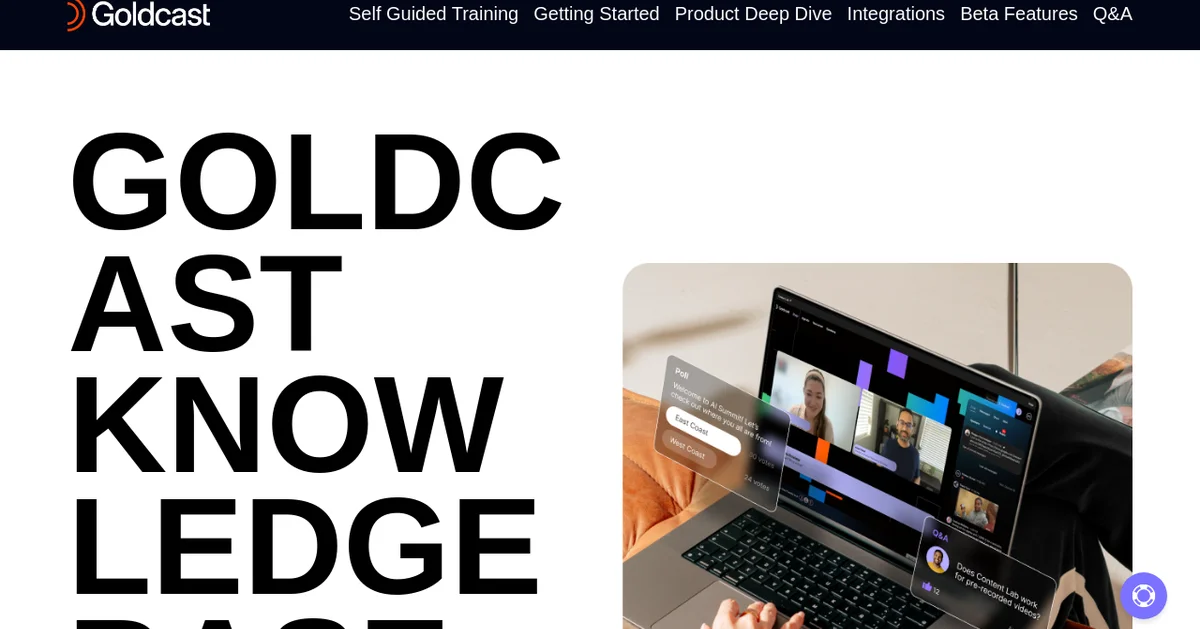
Goldcast is a virtual event platform that creates engaging and interactive experiences for audiences. It caters to businesses and event organizers, offering tools for webinars, conferences, and multi-session events. Users can build a customized event agenda, manage registrations, and analyze performance metrics. Goldcast simplifies the process of hosting online events while fostering connections among attendees.
In a crowded virtual event landscape, Goldcast stands out for its focus on user experience and interaction. The platform provides resources like video tutorials and self-guided training to help users improve their event potential. As organizations move towards digital events, Goldcast positions itself as a reliable choice for delivering memorable experiences that connect with their audience. With a growing user base, the platform continues to evolve, responding to the needs of event planners and marketers.
While Goldcast is a great product, it’s always good to shop around and look for alternatives. This article identifies some top competitors and their pros and cons.
Hopin
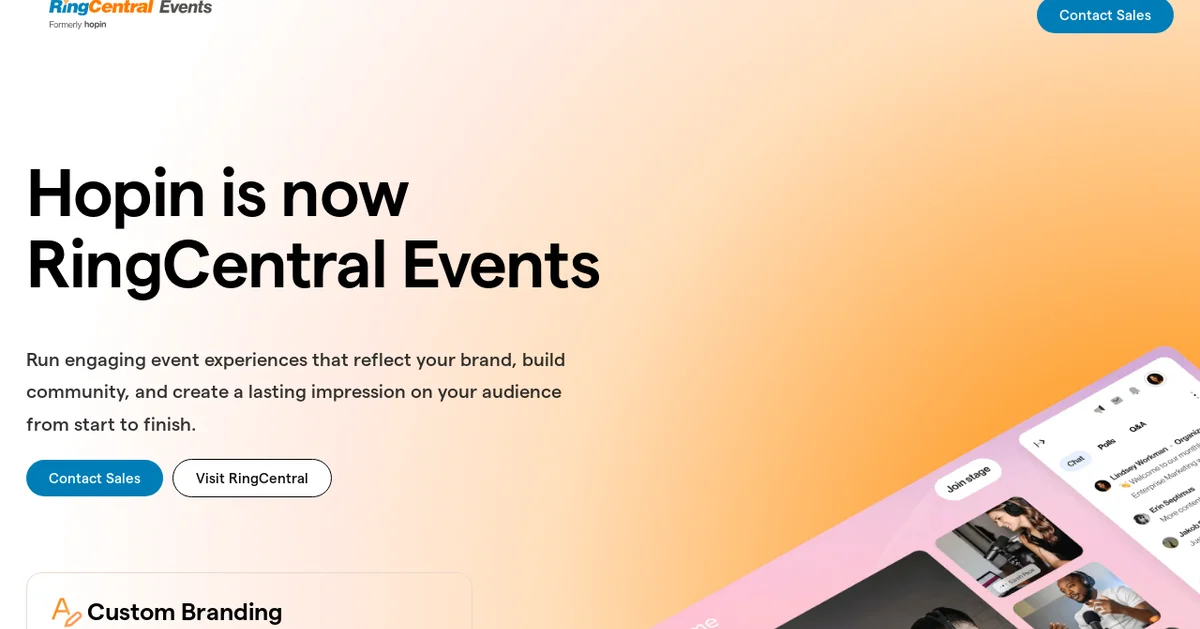
RingCentral Events, previously known as Hopin, has established a notable presence in the virtual event platform market. Created during the rise of remote gatherings, RingCentral Events has continued to adapt to the needs of businesses aiming to create memorable virtual experiences. The focus is on delivering a product that engages attendees and helps brands represent their identity effectively.
A standout feature of RingCentral Events is its customization options. Event organizers can adjust the platform to reflect their brand’s colors, logos, and messaging. This ability to personalize fosters a sense of belonging among participants. Engagement is another important element; RingCentral Events offers tools like chat functions, integrated apps, and Q&A features that keep audiences active throughout the event.
The platform provides various venues, including virtual receptions, stages for keynotes, and networking areas. It lets users curate an experience that feels dynamic rather than flat. The emphasis on high-quality streaming ensures that content can be shared easily across the globe, improving the experience for international audiences.
RingCentral Events’ focus on community building distinguishes it from competitors. It enables organizations to create genuine connections between attendees, fostering lasting relationships. This mix of professionalism and a personal touch resonates well with marketing teams in different sectors.
Pros
- Custom branding options improve brand identity.
- Strong engagement features keep participants active.
- Variety of event venues for flexible experiences.
- High-quality streaming capabilities.
- Focus on community building and connections.
Cons
- Requires time to explore all features effectively.
- May present a learning curve for new users.
- Competition can result in crowded virtual experiences.
Zoom Events
Zoom Events is a solution from the Zoom platform, designed for hosting virtual events. Building on the popularity of Zoom’s video conferencing features, Zoom Events offers a suite of tools for everything from webinars to large conferences. With a user-friendly interface, users can create, promote, and manage events easily, allowing attendees to have a smooth experience.
What sets Zoom Events apart is its ability to integrate with the broader Zoom ecosystem. Event organizers can access existing contacts, tools, and features they already use from Zoom. The platform also includes features like customizable event dashboards, attendee registration, and event analytics, giving organizers insights into participant engagement. This integration helps reduce friction for organizations that already trust Zoom’s video services, making the shift to virtual events feel natural.
Zoom Events serves as a flexible option for businesses, ensuring the experience feels personalized and engaging. It accommodates various event formats, whether it’s a small discussion or a multi-day conference. The platform also supports interactive elements that boost audience participation, an essential aspect for successful events.
Zoom Events provides a solid set of features tailored to virtual event needs, building on a trusted brand while ensuring ease of use.
Pros
- Easy integration with existing Zoom tools
- User-friendly interface
- Customizable event websites and dashboards
- Comprehensive analytics for event performance
Cons
- May not meet niche event needs like specialized platforms
- Limited customization in some features compared to competitors
- Can be overwhelming for new users who are unfamiliar with Zoom
Cvent
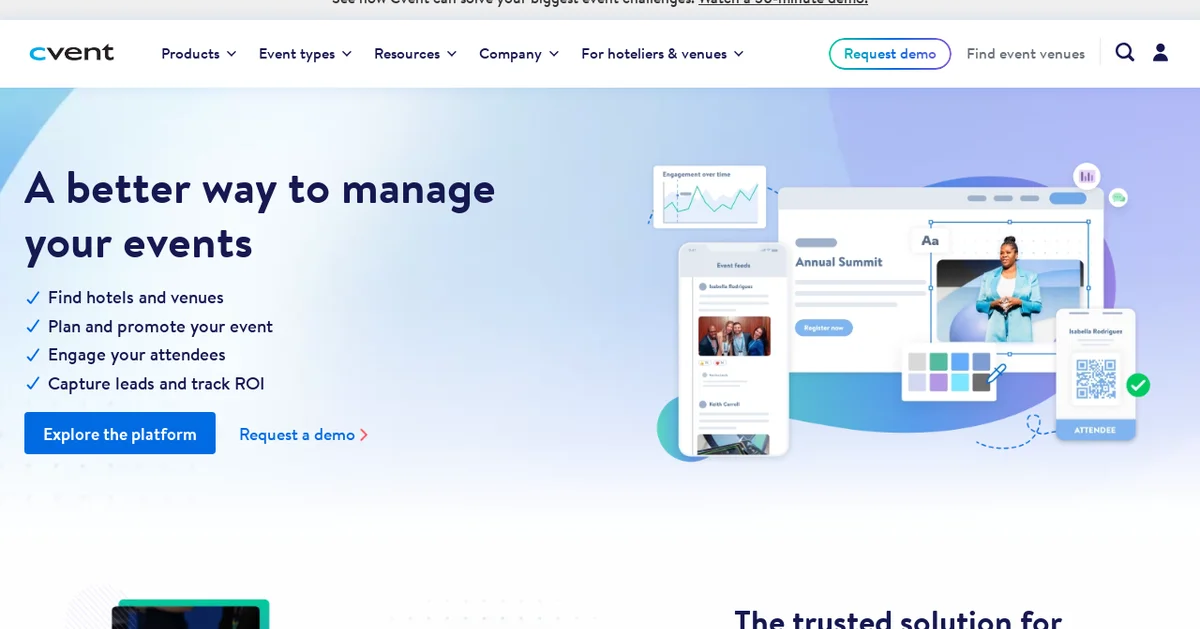
Cvent is a well-established player in the virtual event platform space. With over two decades of experience, Cvent began as basic registration software and has developed into a complete event management solution. Their tools cater to events of all sizes, assisting organizers with planning, marketing, engagement, and data management.
Cvent stands out from competitors, including alt_15, due to its integration of various features that support the entire event lifecycle. From venue sourcing to attendee engagement, Cvent provides a wide range of services. Organizers can access a database of over 300,000 venues, simplifying the search for the right location. The platform also ensures smooth attendee experiences with features like personalized registration pathways and a dedicated event app that keeps participants informed.
Cvent’s focus on data-driven insights is another key advantage. Users can track engagement, calculate ROI, and gather real-time feedback through surveys. This enables event planners to refine their strategies based on practical data. Their lead management and budgeting tools cater to organizations wanting to streamline operations and improve financial oversight.
Cvent’s position as a reliable solution for both in-person and virtual events makes it a strong alternative to alt_15. The platform is designed to grow with users, offering scalability to meet evolving event needs. Integration with other systems allows organizations to send leads directly to sales and marketing, boosting overall efficiency.
Pros
- Comprehensive event management tools
- Extensive venue options
- Strong focus on data and analytics
- Engaging attendee experiences
- Scalable for various event sizes
Cons
- Can be complex for new users
- Pricing may be higher than some competitors
- Some features may need extra training
ON24
ON24 is a player in the virtual event platform space with its Intelligent Engagement Platform. It aims to improve webinars and virtual events by focusing on personalization and engagement. This platform serves businesses that want to create meaningful connections with their audience, a vital aspect in today’s digital environment.
A key feature of ON24 is its ability to personalize content at scale. Users can segment their audience based on factors like demographics, engagement levels, and buying intent. This allows companies to tailor the experience for different audience groups, making each interaction feel unique and relevant. The platform also emphasizes ongoing engagement, allowing users to interact with their audience 24/7 through automated content and nurturing strategies.
Tracking audience engagement is another strong point. ON24 provides tools to analyze performance across every touchpoint. Businesses can see what captures their audience’s attention, helping them refine future content and strategies. Additionally, integration with tools like Salesforce Pardot streamlines processes, making it easier for marketing teams to act on insights and drive conversions.
ON24 enhances the traditional webinar model, changing it into a powerful marketing and engagement tool. This shift has been effective for many companies, which have reported significant revenue growth and time savings after adopting ON24.
Pros
- Strong personalization capabilities for audience segmentation
- Ongoing engagement options with 24/7 audience interaction
- Detailed performance analytics to optimize future events
- Seamless integration with popular marketing tools
Cons
- May not be as user-friendly for first-time users
- Focus on larger organizations could overlook smaller businesses’ needs
vFairs
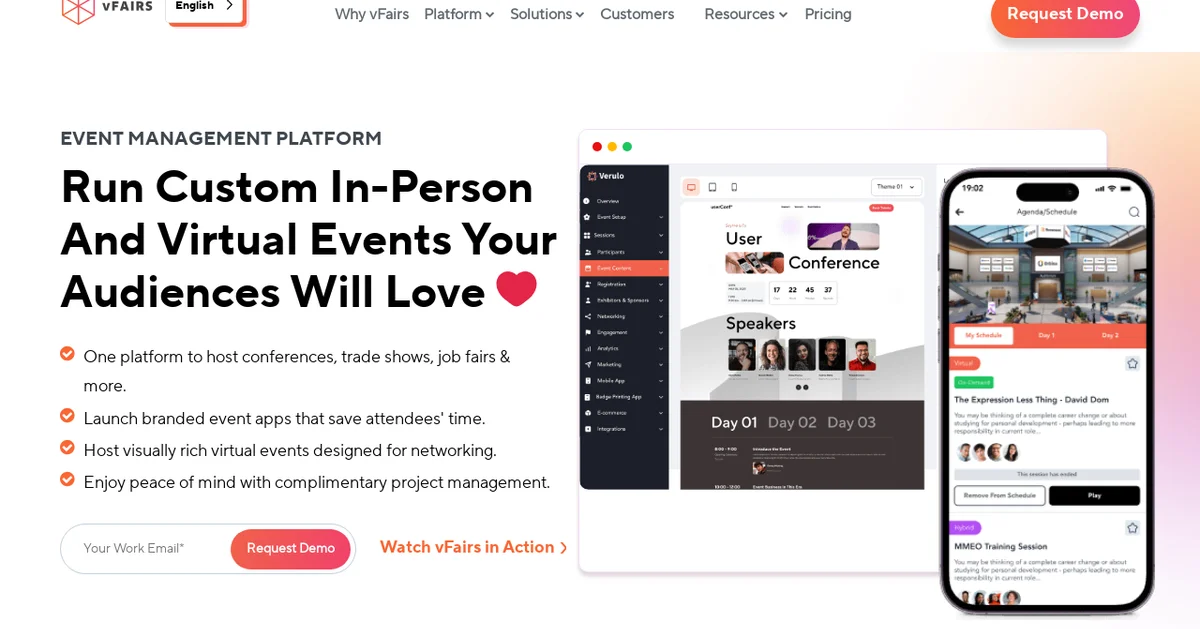
VFairs is a notable player in the virtual event platform space. They cater to various events, from job fairs to expos, offering an engaging experience for attendees and organizers. What sets vFairs apart is their immersive virtual environments, allowing businesses to create customizable booths that replicate the physical event experience. Users can choose from different layouts, themes, and interactive features to craft a unique online presence that matches their brand.
A key highlight is their focus on accessibility. With multilingual support in English, French, German, and Spanish, vFairs ensures that businesses can connect with audiences from diverse backgrounds. This inclusivity broadens the reach and appeal of events, making them accessible to a global audience.
VFairs excels in analytics. Organizers can track attendee engagement in real-time, providing insights into which areas draw the most interest. This information is valuable for improving future events and boosting marketing efforts.
The platform features live chat, webinar capabilities, and networking lounges, fostering a sense of community. This interactive element helps recreate the real-world connection that attendees often miss in virtual events.
VFairs presents a strong alternative to alt_15. Their customizable virtual environments, accessibility features, and solid analytics can significantly improve the virtual event experience.
Pros
- Customizable virtual environments
- Multilingual support for broader reach
- Strong analytics for event insights
- Interactive features like live chat and networking lounges
Cons
- User interface may require a learning curve
- Pricing structures could be complex for some users
BigMarker
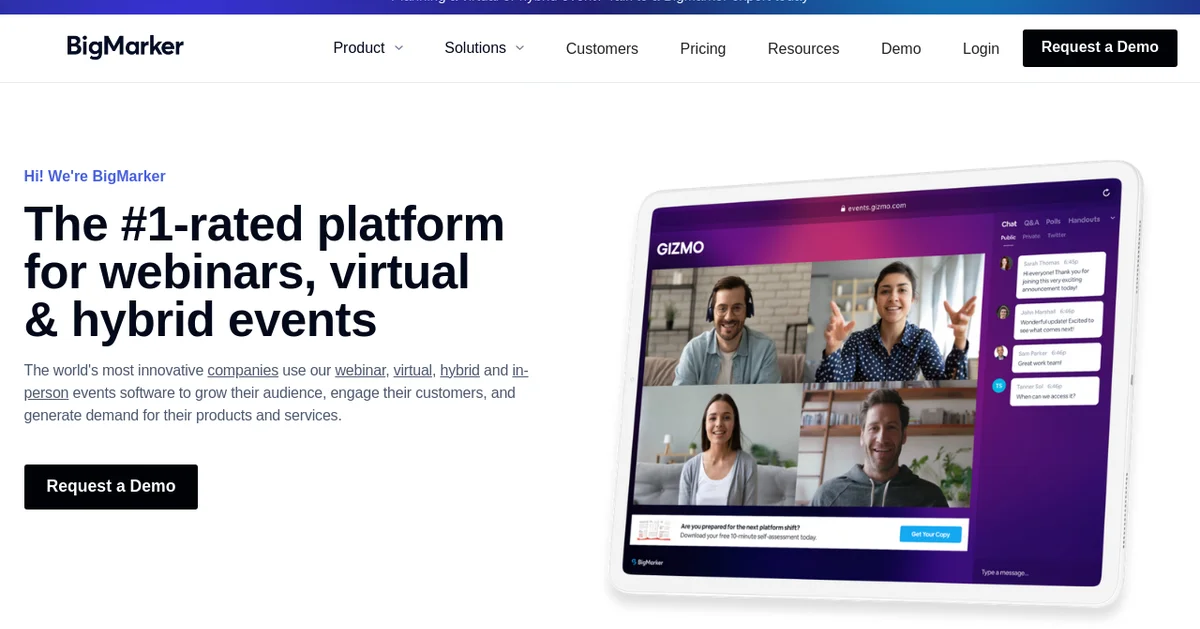
BigMarker is a prominent player in the virtual event platform space, offering businesses a solid solution for webinars and hybrid events. With a focus on audience engagement and demand generation, BigMarker serves as a viable alternative to alt_15 for companies aiming to host impactful events.
One of BigMarker’s standout features is its customization options. Organizers can create unique virtual events that include ticketing, networking opportunities, and sponsorships all on one platform. This flexibility suits various event types, from one-hour webinars to multi-day conferences. BigMarker also prioritizes content delivery through its studio features, allowing users to create high-quality live streams and recordings.
The platform’s emphasis on data-driven insights is another highlight. BigMarker offers actionable analytics, helping hosts understand audience behavior and improve future events. Access to these insights can significantly impact event strategy.
BigMarker values customer satisfaction, consistently receiving high ratings in ease of use and service. Its support team is known for being responsive and knowledgeable, which is important for users needing help during events.
BigMarker provides event planners a solid platform that combines ease of use, customization, and strong analytics. Whether hosting a virtual conference or a hybrid gathering, users can expect a well-rounded solution that improves attendee experiences.
Pros
- Customizable event features, including ticketing and networking
- High-quality live streaming and studio capabilities
- Strong focus on data analytics for ongoing improvement
- Excellent customer satisfaction ratings and responsive support
Cons
- May require a learning curve for new users
- Some advanced features may not be necessary for smaller events
Bizzabo
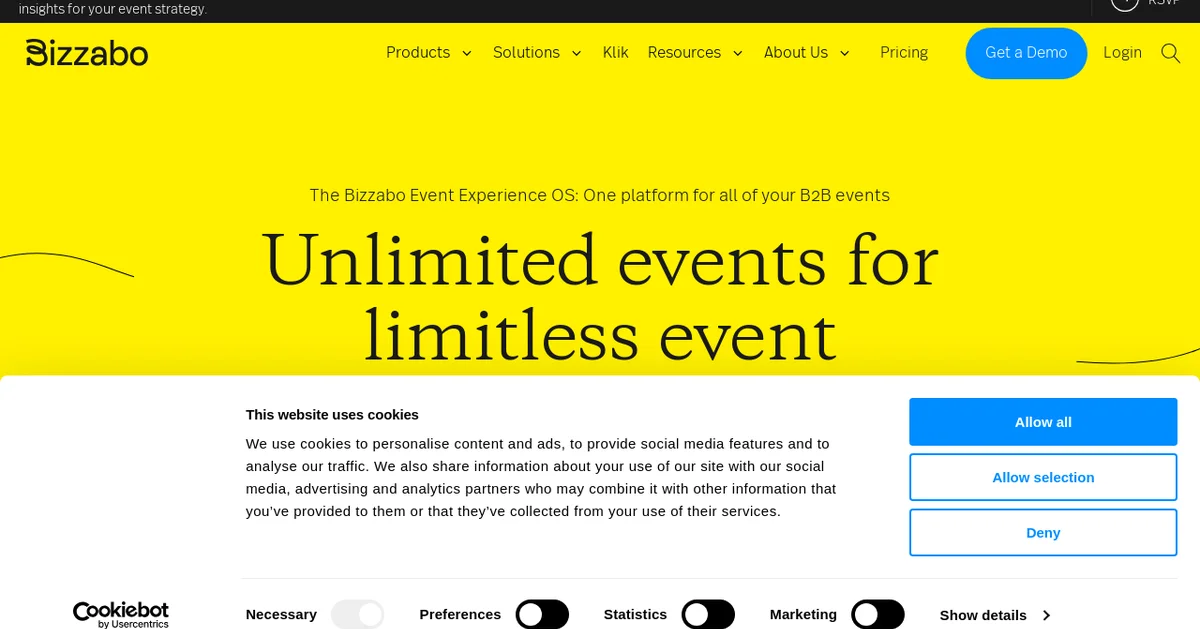
Bizzabo is making an impact in the virtual event platform market. Known for its Event Experience Operating System, Bizzabo focuses on improving attendee engagement and measuring event success. They cater to various events, including conferences, webinars, and field events, offering tools that simplify planning and execution, making it an appealing choice compared to alt_15.
Bizzabo stands out with customizable features, including dynamic registration processes and a branded event app. Users can create event sites suited to their needs and manage complex multi-day agendas. An interesting aspect is its Klik Experiential technology, which changes traditional badges into interactive wearables. These smart badges improve networking and provide data on attendee behavior, resulting in a more engaging experience.
Another strong point is their focus on integrating event data with CRMs, helping companies track leads and demonstrate event ROI effectively. This allows businesses to make informed decisions and adjustments, improving sales and sponsorship opportunities.
Bizzabo’s position as a leader in the event technology field, recognized by awards like the 2024 Gartner Magic Quadrant, reinforces their credibility. Their focus on a complete approach to event management appeals to organizations aiming for growth.
Bizzabo offers a solid platform with unique features that improve event experiences, provide valuable insights, and drive revenue.
Pros
- Comprehensive event management tools
- Customizable event sites and registration
- Innovative wearable technology for networking
- Strong CRM integration for tracking leads
- Recognized leader in event technology
Cons
- May require a learning curve for new users
- Pricing may be higher than some alternatives
Webex Events
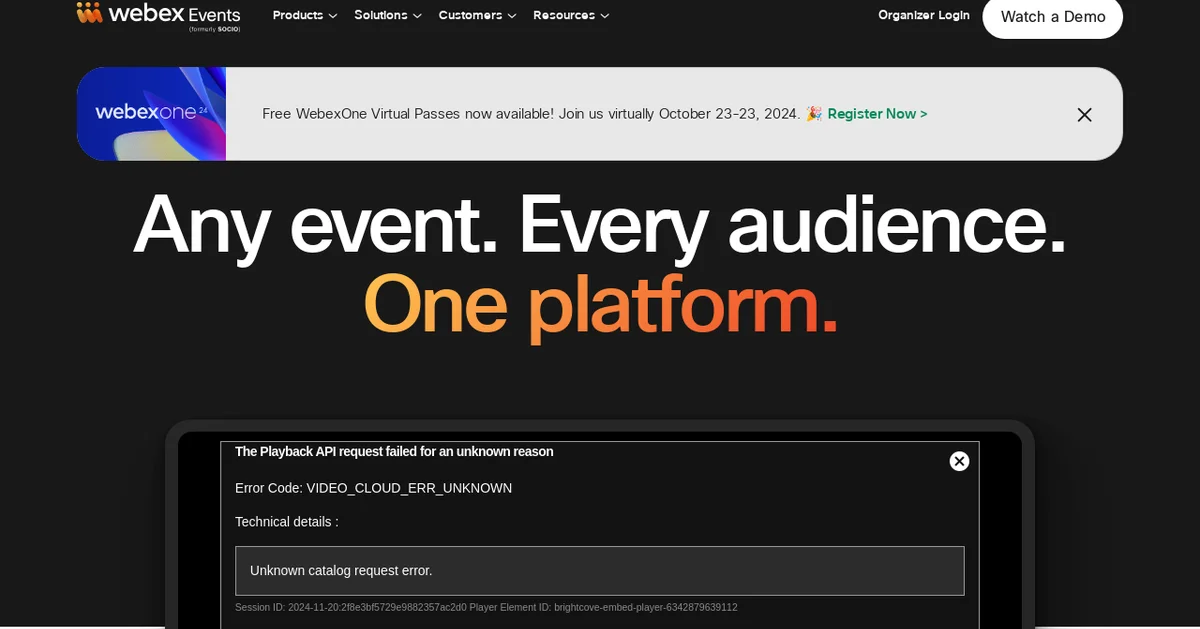
Webex Events is a strong platform for hosting virtual events, focusing on user-friendly experiences and integration with other tools. Originally called Webex, this platform has evolved, powered by Cisco’s technology. Companies and organizations choose Webex Events for its flexible solutions, whether hosting a small team meeting or a large conference.
One key feature of Webex Events is its interactive capabilities. Attendees can engage through polls, Q&A sessions, and chat, promoting real-time interaction. The platform also prioritizes security, with measures to protect user data. This is crucial for companies managing sensitive information that need assurance.
Another notable aspect is the easy integration with the larger Webex suite of tools. You can transition from an event to a team meeting smoothly, making it a practical option for businesses already using Cisco solutions. Additionally, Webex Events offers a customizable experience, allowing brands to adjust their virtual environment without a steep learning curve.
Webex Events excels in analytics. Users can access comprehensive reports on attendee engagement, assisting organizations in refining their strategies for future events. This data-driven approach distinguishes it in a competitive market, where understanding audience behavior can lead to better results.
Pros
- User-friendly interface
- Strong security features
- Integration with the broader Webex suite
- Interactive engagement tools
- Detailed analytics and reporting
Cons
- May require a learning curve for new users
- Service pricing can be high for smaller businesses
- Some features may be underused in smaller events
Airmeet
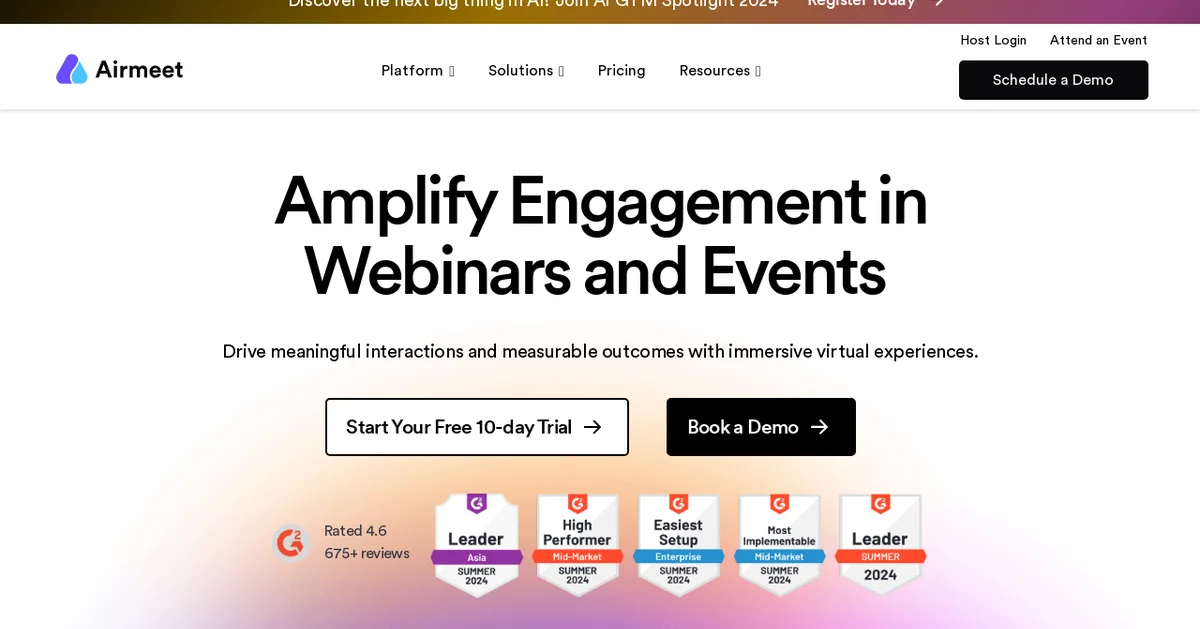
Airmeet stands out as a platform for hosting virtual events and serves as a solid alternative to alt_15. It focuses on attendee engagement and offers unique features that suit various event types, from webinars to large conferences. One highlighted feature is gamification, such as leaderboards, which fosters competition among participants, driving interaction and making events more engaging.
Airmeet also emphasizes networking with its breakout rooms and speed networking sessions, allowing participants to connect in a personal setting. This functionality creates a lively atmosphere and helps build valuable connections that can lead to meaningful opportunities.
The platform excels in customization. Users can design event landing pages to align with their branding and messaging, improving brand recall. Integration with over 50 applications, including CRM tools, streamlines managing and analyzing participant data. This helps in crafting follow-up strategies that boost conversion and progress in the sales pipeline.
Airmeet aims to simplify the experience for both organizers and attendees. Its engaging features have contributed to a strong reputation, supported by positive user reviews. Many users value the platform’s support, especially during large events, highlighting their commitment to ensuring a smooth experience.
Airmeet offers a mix of engagement, customization, and integration that distinguishes it from alt_15.
Pros
- Engaging gamification features like leaderboards
- Strong networking capabilities with breakout rooms
- High level of customization for branding
- Seamless CRM integration for managing data
- Positive user feedback and responsive support
Cons
- May have a learning curve for new users
- Some features might be overwhelming for smaller events
- Cost could be a consideration for budget-conscious organizers
Remo
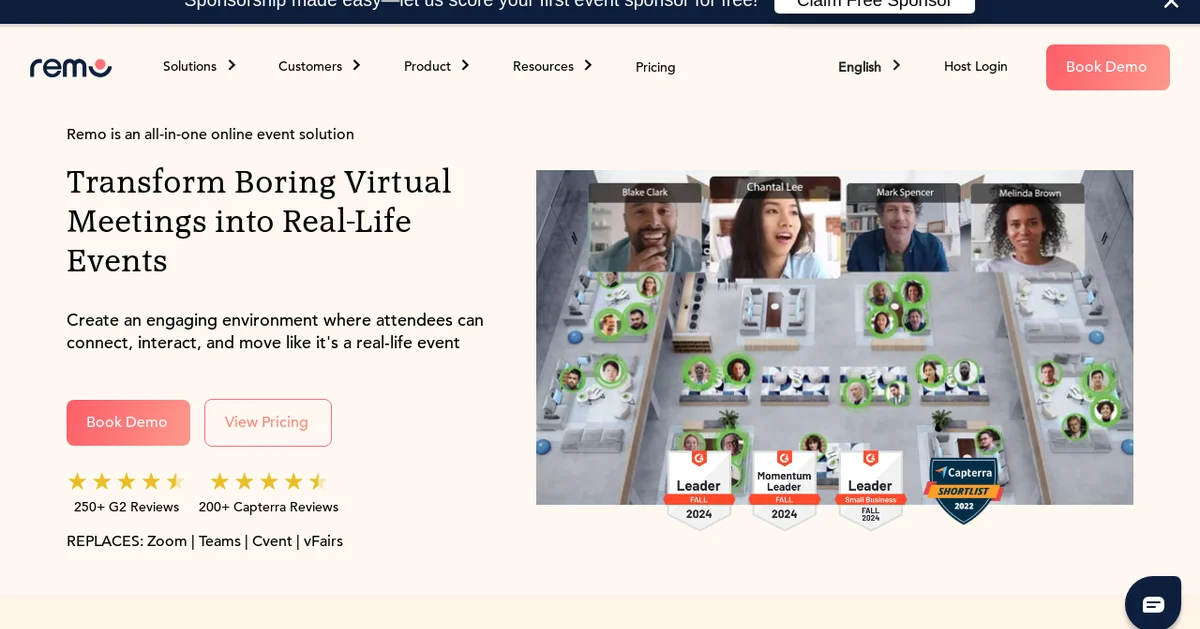
Remo is a virtual event platform designed to make online gatherings engaging and interactive. It aims to change the dull experience of ordinary virtual meetings by providing a space that resembles live events. This approach allows attendees to connect and interact in a way that feels more natural and less like a video call.
One of Remo’s key features is its spatial technology, enabling guests to navigate virtual spaces like they would in real life. Attendees can move between tables and join conversations seamlessly, fostering genuine networking opportunities. This creates an environment where connections develop more organically, improving the overall experience.
Remo supports a variety of event types, from webinars and networking sessions to conferences and trade shows. Each event can be branded using customizable floor plans that help hosts recreate real-world settings. This visual appeal captivates attendees and helps maintain their attention throughout the event. Additionally, tools for interactive polls and live Q&A sessions boost engagement, achieving 3.2 times more interaction compared to traditional video conferencing tools like Zoom and Teams.
Real-time support distinguishes Remo, ensuring organizers have assistance available whenever needed. This significantly reduces the stress of managing an event, allowing hosts to focus on content and engagement rather than technical issues.
Remo offers a solution for hosting immersive virtual events. Its focus on realism, strong networking capabilities, and solid support make it a compelling choice.
Pros
- Engaging, realistic networking experience
- Customizable, branded event spaces
- Higher attendee engagement
- Multiple event types supported
Cons
- May require a learning curve for new users
- Relatively new compared to some competitors
Socio
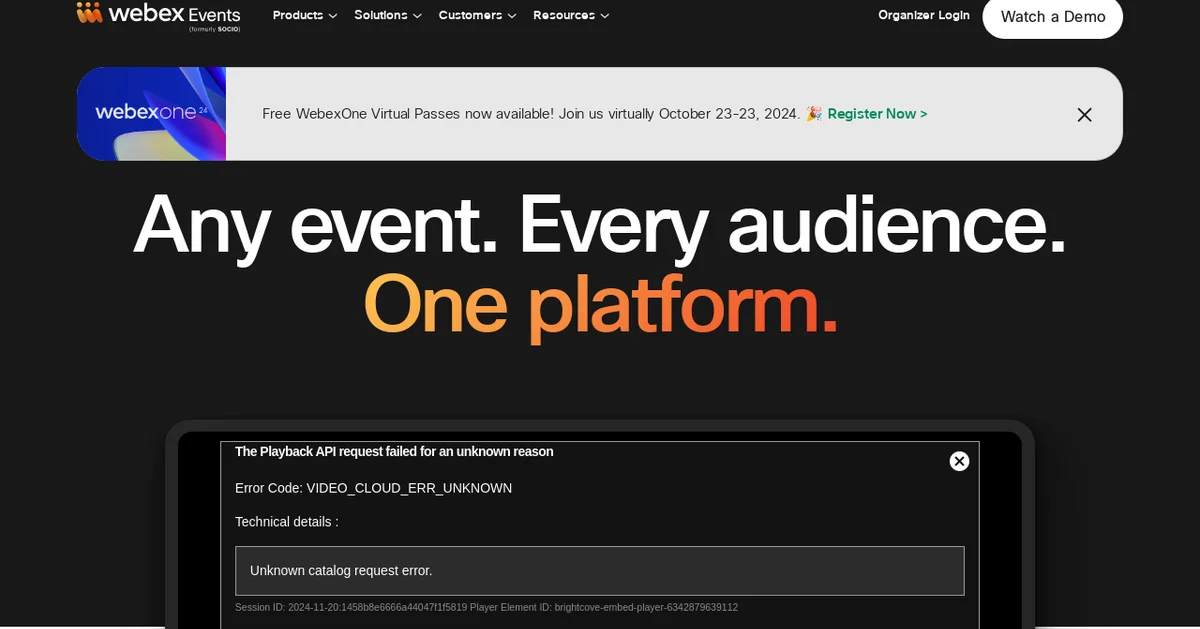
Socio is a key player in the virtual event platform market, especially recognized for its focus on mobile event apps. What sets Socio apart is its emphasis on a seamless experience for attendees and organizers, combining engagement tools with data analytics. The platform supports various event types, from small meetings to large conferences, making it a flexible choice for businesses.
A notable feature of Socio is its strong integration capabilities. Users can connect with popular tools like Zoom, Salesforce, and HubSpot, improving their workflow and boosting lead generation. The platform also excels at fostering networking opportunities. Attendees can interact through chat, one-on-one meetings, or by joining relevant interest groups, facilitating valuable connections.
Socio’s mission is to simplify the event experience while improving engagement. Established to support event organizers, the platform reflects a user-focused approach. Its design allows for extensive customization, ensuring that events can maintain a brand’s identity while providing engaging experiences tailored to specific audiences.
Many find Socio’s analytics particularly appealing when shifting from alt_15. The built-in reporting tools offer insights that can improve decision-making for future events. Tracking attendee engagement and collecting feedback helps event planners continually refine their strategies.
Pros:
- Robust integration options with popular tools
- Strong focus on attendee networking
- Customizable platform to fit brand identities
- Comprehensive analytics for better decision-making
Cons:
- Learning curve for new users
- Some features might be more complex than needed for smaller events
Whova
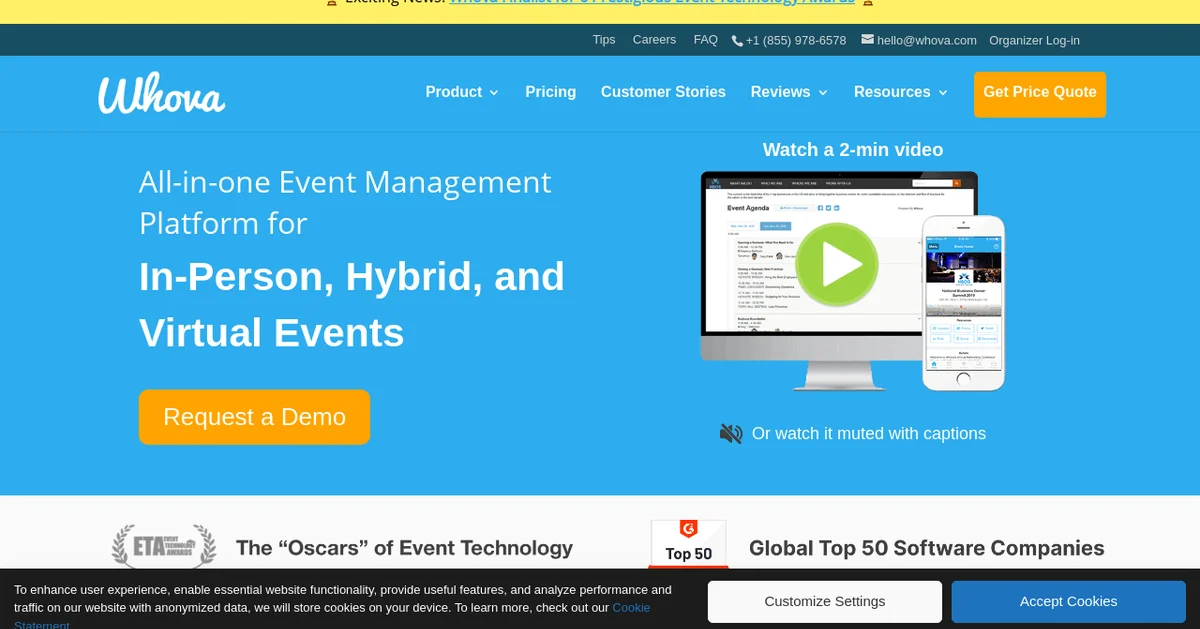
Whova is a versatile platform in the virtual event space, offering a solution for in-person, hybrid, and virtual events. The platform has gained recognition for its user-friendly event app, which boosts attendee engagement with live polls, personalized agendas, and real-time updates. This focus on user experience creates a more interactive environment, helping attendees connect and increasing overall satisfaction.
One of Whova’s key features is its event management tools, which simplify logistics such as agenda creation, speaker coordination, and attendee check-in. Organizers save time with these streamlined processes, allowing them to focus on planning. The platform also excels in promoting sponsors and exhibitors, providing tools like business card scanning and QR code integrations that improve lead generation and ensure a strong return on investment.
Whova aims to make events more accessible and enjoyable for everyone involved. They emphasize supporting event organizers with user-focused solutions and offer quick assistance, providing reassurance during planning. Their adaptability allows them to cater to a broad range of events, from corporate conferences to festivals, making them a flexible choice compared to alt_15.
Whova’s distinct features and solid market presence provide compelling reasons to consider them alongside alt_15. The focus on attendee engagement, efficient logistics, and effective marketing tools allows organizers to create memorable experiences while lessening stress.
Pros
- All-in-one event management platform
- User-friendly mobile app for attendees
- Time-saving logistics features
- Strong focus on attendee interaction
- Effective marketing tools for sponsors
Cons
- May lack some advanced customizability compared to competitors
- Initial learning curve for new users
EventMobi
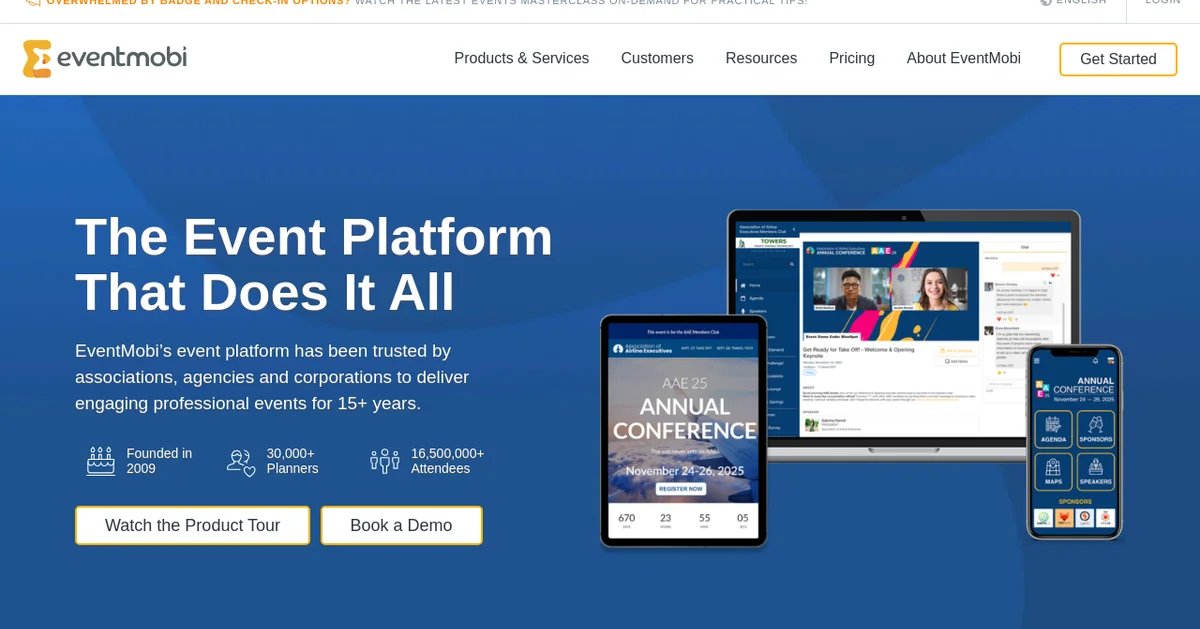
EventMobi has built a solid reputation in the virtual event platform market, serving a range of clients, including associations, agencies, and corporations for over 15 years. Their mission has been to improve event experiences, and they’ve accomplished this by providing engaging solutions for event organizers.
A key feature is their flexible event management options. Whether in-person, hybrid, or fully virtual, EventMobi offers an all-in-one platform that combines registration, engagement, and analytics. Event planners can create customizable mobile event apps that cater to their audience, fostering connection and engagement throughout the event.
Their networking tools promote interactions among attendees through one-on-one chats, group discussions, and sponsor content, keeping attendee interest alive and creating a sense of community long after the event ends. The focus on data privacy is also significant. EventMobi ensures complete ownership of event data and provides password protection, safeguarding sensitive information.
User feedback points to the straightforward design of EventMobi’s platform, making it easy for both attendees and organizers. Their dedication to support is also notable, with many users appreciating the help they receive.
EventMobi offers tools that extend beyond basic event management to improve experiences and build lasting relationships.
Pros
- Flexible platform for various event types
- Customizable mobile event apps
- Strong focus on data privacy and security
- User-friendly interface for attendees and organizers
- Comprehensive networking tools
Cons
- May require some adjustment for new users
- Lacks advanced features compared to competitors
PheedLoop
PheedLoop has established itself in the virtual event space, serving organizations of all sizes. It offers a solid solution for managing everything from in-person gatherings to fully virtual or hybrid events. The platform stands out for integrating multiple features into a single interface, making it easy for users to navigate and execute their event plans.
PheedLoop’s emphasis on customization sets it apart. Event organizers can create personalized event websites and mobile applications with full CSS and JavaScript support. This level of personalization helps companies maintain their brand identity while providing a tailored experience. The mobile app, PheedLoop Go., syncs in real-time with event data, giving attendees instant access to schedules, sessions, and networking opportunities.
PheedLoop also provides analytics that offer valuable insights. Tools for in-depth tracking and reporting help companies like Shopify and NASA optimize their event strategies, supporting data-driven decisions. They have even added unique features, like personalized badges that improve attendee interactions, making each connection feel meaningful.
PheedLoop not only aims to improve events but also to build a community around them, fostering connections that last beyond the final session.
Pros
- Customizable event website and app
- Real-time data synchronization
- Strong analytics for improvement
- Focused on both in-person and virtual experiences
Cons
- Possible learning curve for new users
- Customization might be overwhelming for simple events
Attendify
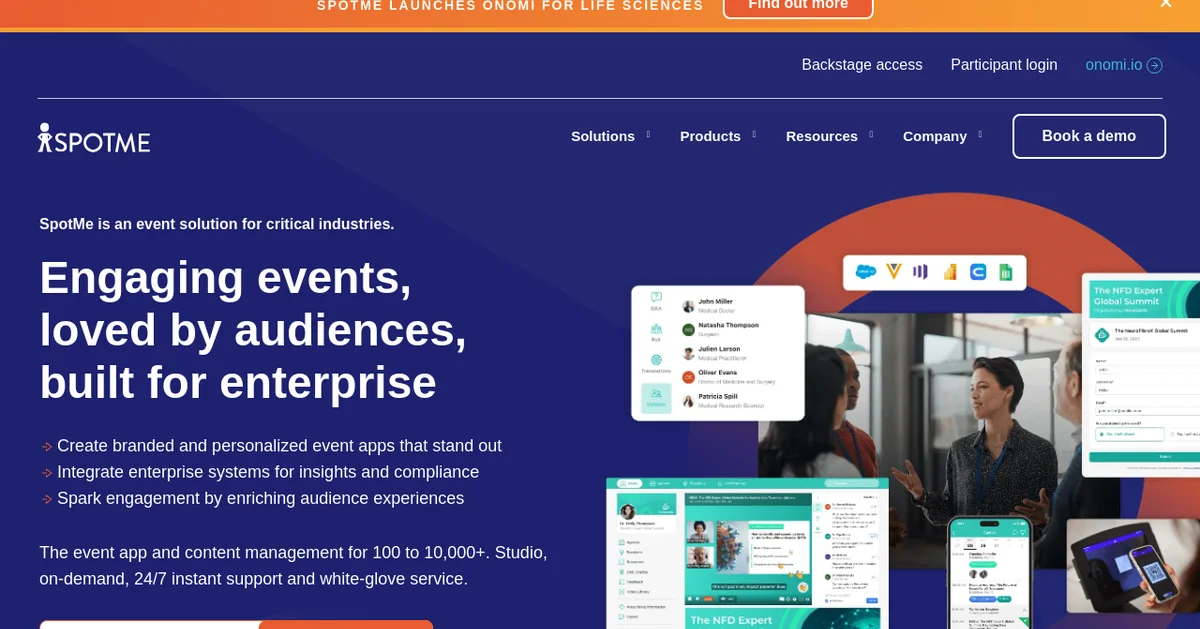
Attendify is an event platform for businesses that want to create engaging virtual events. They cater to various industries, focusing on making events enjoyable and interactive for participants. One standout feature is the customizable event app that enhances user experience, allowing attendees to interact with event content and network effectively. This level of personalization can differentiate a company’s event and make it more memorable.
Attendify’s history is based on the goal of streamlining event management and improving audience engagement. They recognize that creating a sense of connection is vital. They offer features like social feeds, Q&A sessions, and polls that encourage real-time interaction at events. Their approach focuses on fostering not just participation but genuine engagement.
Another aspect that sets Attendify apart is its analytics capabilities. Users can gain insights about attendee behavior, allowing them to refine future events using data. This depth of analytics can lead to better decisions and improve event planning.
Additionally, Attendify emphasizes its commitment to security and reliability, ensuring sensitive user data is protected. They serve enterprises, ensuring that events can scale effectively without compromising quality or safety.
Pros
- Customizable event apps improve participant engagement.
- Real-time interaction features foster community and connection.
- Strong analytics tools provide actionable insights after the event.
- Focus on security and reliability, meeting enterprise needs.
Cons
- May require a steeper learning curve for new users.
- Customization options may overwhelm those seeking a straightforward setup.